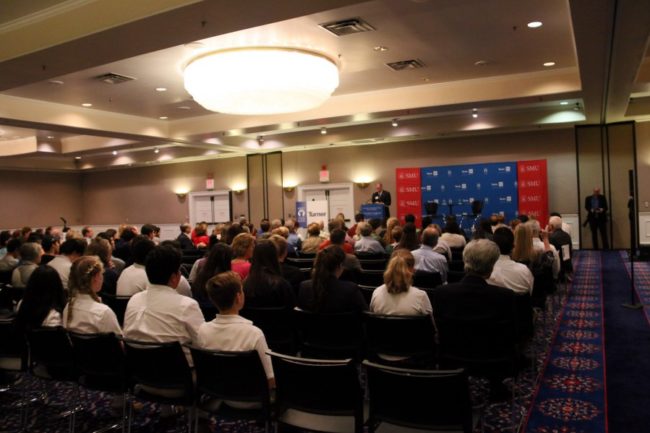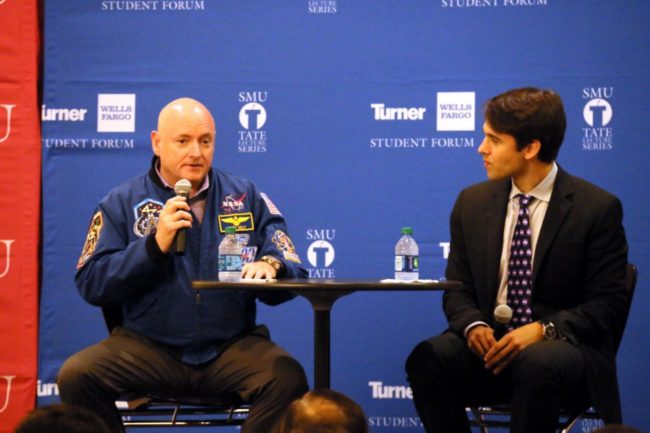The SMU Hughes-Trigg ballroom filled up quickly on a Tuesday afternoon. SMU students and faculty, along with young children and students from other schools in the Dallas area, anxiously waited for the astronaut’s on-stage arrival.

The SMU Tate Lecture series brings guest speakers to the university throughout the school year. This month, the Tate Lecture hosted Captain Scott Kelly, an American astronaut who holds the longest record of living in space. From March 2015 to March 2016, Captain Kelly conducted experiments and captured photos from the International Space Station.
Good morning, #California! What did I like most about flying in space? Excited to be here today to talk about this! pic.twitter.com/NA7a0DdjE4
— Scott Kelly (@StationCDRKelly) September 28, 2016
Julie Allen, former Episcopal School of Dallas teacher, was one of many audience members at the lecture. She looked forward to hearing about Captain Kelly’s experiences in space.
“I’d like to hear about what kind of experiments he did, what his daily schedule was like and if they really slept eight hours a night,” Allen said.
She wouldn’t have to wait much longer. Captain Kelly and SMU law student Kori Rady, who served as the moderator, arrived promptly on stage. Captain Kelly was greeted with a loud applause.

Captain Kelly was first asked why he originally made the decision to go to space, considering how costly it is.
“I think by doing the really really hard things and generally exploring a place that you’ve never been, we get a big technological return on our investment,” Kelly said.
Captain Kelly also expressed excitement for going to Mars one day, when the planets align.
“There’s more that we need to know before going to Mars, but I think between now and the next decade is a reasonable amount of time,” he said.
Captain Kelly recalled a time when a reporter asked him about how soon it would be before an astronaut will land on Mars, considering water has already been found on the planet.
“I don’t know,” Kelly said. “But now, if we found money on Mars then we would get there really fast.”
The room instantly burst into laughter. Captain Kelly discussed the misleading information about the reason he was chosen to go to space as well.
“A lot of people think that I was selected to go to space because I have an identical twin brother and he would have been the perfect control group for a scientific experiment where you have on twin on Earth and one in space,” Kelly said.
Captain Kelly’s brother Mark is also an astronaut. However, this did not influence his decision to go to space, according to Captain Kelly.
Additionally, he discussed a topic most people are curious about: his day-to-day life in space.
“I would wake up at 6:45 in the morning,” Kelly said. “Unless, I was doing something like drawing my blood in the morning, I would get up at this time to go to our daily conference at 7:30.”
His day consisted of a very rigid schedule of activities.
“The day would vary from doing an experiment,” Kelly said. “About 30 percent of the time we were doing scientific experiments, the other time was dedicated to general maintenance.”
Another routine part of Captain Kelly’s schedule surprised and even made some audience members gasp.
“On the space state we turn our urine into water, which we then would drink and turn back into urine,” he said.
He also spent a lot of time exercising.
“If you don’t exercise you lose a lot of bone mass,” he said.
Captain Kelly and his colleague conducted various experiments throughout their time in space as well. The science, according to Kelly, was classified into three different categories. The first aspect is the international component. For example, working with the European space agency, the Chinese, Russians and various other international groups. The second aspect was exploration based.
“It’s the stuff that we need to know to send astronauts further away from Earth one day,” Kelly said. “Like how to make a better system to scrub carbon dioxide from the atmosphere.”
The third part was based on basic research. For instance, Kelly would test drugs on rodents that would potentially be used by humans.
“We even had a little mouse X-Ray machine,” he said.
Captain Kelly originally didn’t think any of this was possible. He didn’t think being an astronaut was an option for him.
“I wasn’t a particularly good student,” he said.
However, he was up for the challenge.
“It was really all about flying the next most difficult airplane to fly, which I felt was the space shuttle,” he said. “And I was absolutely correct.”
Captain Kelly discussed the kind of food he would eat in space. His favorite was barbecue beef and granola for breakfast, as he would eat granola for breakfast at home too. However, he doesn’t give space food the best of reviews.
“‘Good’ and ‘space food’ generally don’t go together,” Kelly said as the crowd chuckled.
Captain Kelly also mentioned how important it is to be good at an array of things in space.
“When you are on a space station you are not only the astronaut, you are the plumber, the electrician, the IT person, in some cases the test pilot, the doctor and the dentist,” Kelly said.
He had to perform tasks in each of the categories he mentioned.
“I’ve even replaced teeth of my fellow crew members,” Kelly said.
Captain Kelly’s advice for those wanting to go to space is to work in a qualifying field, and something that he or she is passionate about.
“Some kind of science, math, physics or engineering,” Kelly said. “Having a technical background is important because this is a technical job.”
Although Captain Kelly went to space well-prepared, there are some things that did take him by surprise.
“I was surprised with how long a year is,” he said. “It’s a really long time.”
However, he had a strategy to getting through the days that just seemed to go on forever.
“I never tried to look toward the end of it,” he said. “I never counted the number of days left.”
It took Captain Kelly six months to adjust being back on Earth. He was used to the rigid schedule in space.
“I can remember sitting there on my couch thinking, hmm I don’t know what to do,” he said.
It was evident that the audience enjoyed the forum. SMU sophomore Jennifer Sustarich followed Captain Kelly’s year in space through the various photos he would post. She did not leave disappointed.
“He’s really funny and open about everything,” Sustarich said. “There’s not a lot that he hesitated to share.”
Captain Kelly ended the forum with encouraging words for the audience.
“One great thing about this country we live in is that anything is possible,” Kelly said. “Anyone can become anything if they work hard enough at it.”











